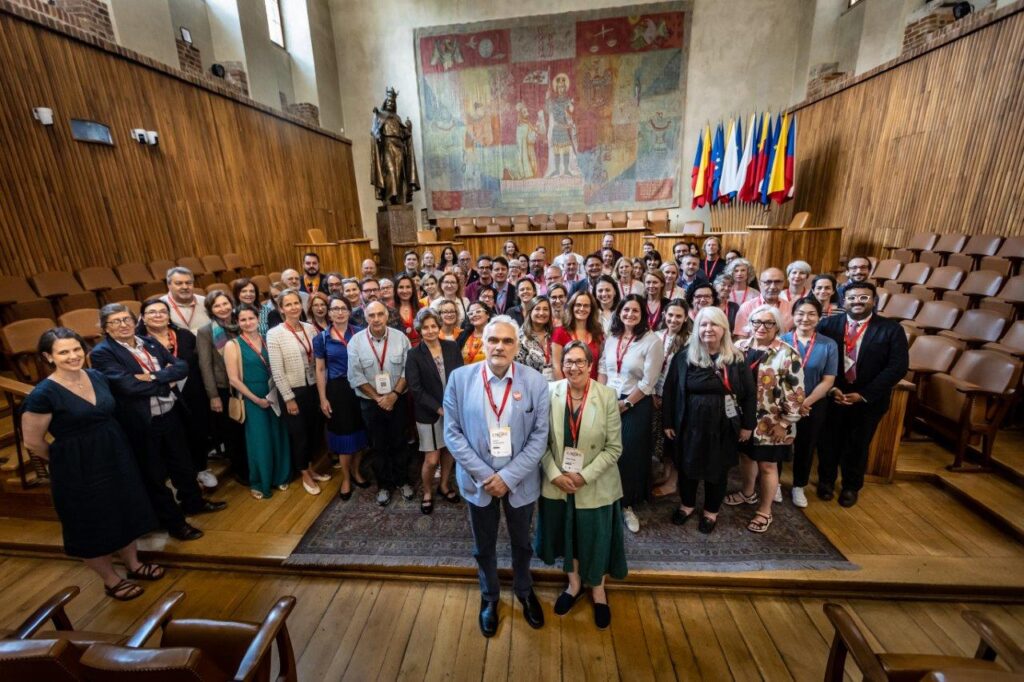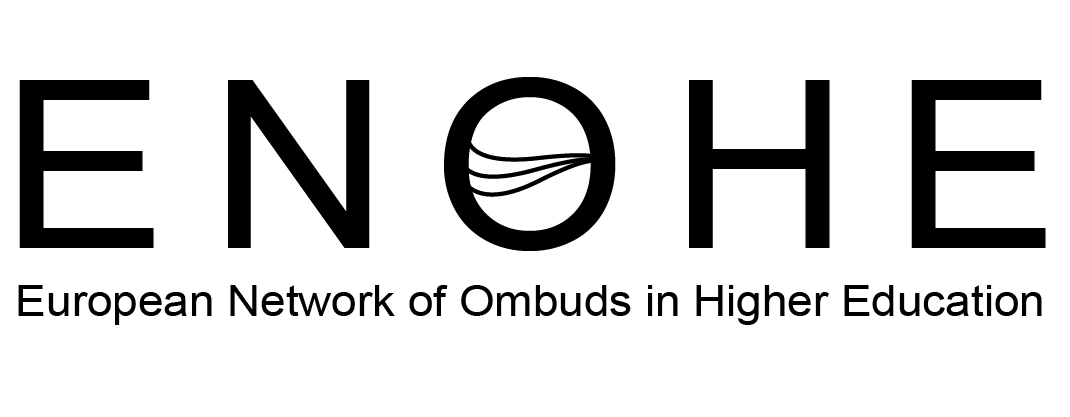ENOHE Conference in Prague: All-time High Participation, New Leadership Elected, Goals set for the Future
POSTED ON BY ENOHE SECRETARIAT

Participants at ENOHE Conference in Prague 2023
With almost 100 participants from more than 20 countries from Europe and beyond the annual conference of ENOHE in Prague this week showed the highest attendance in this association’s recent history. Celebrating 20 years of networking among higher education ombudspersons was the background for the event, hence the title was “From Amsterdam 2003 to Prague 2023. Higher Education Ombuds Offices: Reviewing! Reforming! Restarting?”.
In 20 working sessions during the three days essential topics of the work of ombudspersons were covered, including ombudsperson positioning vis-à-vis the decision makers; reporting; relations with student representatives; professionalisation; evaluation; interaction with the broader community; and practical issues in everyday work. Three keynotes were delivered on current issues in academia.
On the Wellbeing of Students, Developing the Ombudsperson’s Role
Radka Wildova, Director General of the Czech Ministry of Education, Youth and Sports, set the scene in her opening speech: the topic of ombudspersons as part of broader issues concerning wellbeing of students and social dimension is emerging in Czech higher education recently. Universities must prepare students to become active, critical and responsible citizens and support them in their societal role. The role of ombudspersons is crucial in this development; they are at the same time committing to safeguard students’ rights in their academic environment.
Milena Králíčková, the (first female) Rector of Charles University, stressed the fact in her opening remarks that ENOHE with its network will be giving global insight and room for further developments of the profession. Her university considers ombudspersons as a great opportunity for professional growth.
The three-day conference was preceded by ENOHE’s first Training Activity Program on mediation, conflict resolution and complaint handling skills, topics which were further explored during several of the conference sessions.
Changed Statutes, New Governance Team
During the Annual General Assembly meeting of the association, the statutes (first set out in 2019) were adjusted to incorporate changes needed to comply with Austrian Association Law, and in the light of experience of working with the statutes since becoming a registered association four years ago. Provision has been made for the designation of deputies and advisers for key roles, to ensure continuity of business processes. Changes were made to the membership, fiscal and governance years to enable smooth transition of governance.
Having sought nominations for posts falling vacant this year, a new president, vice-president, treasurer and seven new board members were appointed. Honorary membership for a lifetime was awarded to four long-standing activists for ENOHE – two from the UK, one from Spain and one from Mexico.
After the Prague Manifesto: Extending and Supporting Further Professionalisation
As laid down in ENOHE’s Strategic Plan 2021 to 2025 and requested by several conference participants, the further promotion of the development of university ombudspersons’ role is an important achievement to come, especially with regard to the next “Bologna Ministerial Conference” in Tirana, Albania in 2024. This and other issues are laid down in the “Prague Manifesto” issued at the end of the conference and serving as an orientation for the time to come.
“We have achieved a lot during the last week, together with a crowd of friends and colleagues from five continents. We are very happy to be the heads of such a group of enthusiasts and are looking forward to the next twenty years.”, said the outgoing president Josef Leidenfrost and the incoming president Jean Grier when summarizing the conference’s results.
A conference publication and a photo collection will be made available in due time.
Ursula Meiser was elected and will be replacing Jean Grier as vice-president of ENOHE.
The new members of ENOHE’s Board are: Guadalupe Barrena, Mexico; Brent Epperson, Luxembourg; Gizem Güray, Turkey; Anna-Katharina Rothwangl, Austria; Thomas Rypka, Austria ; Ryan Smith, United States of America; Pelin Zenginoglu, The Netherlands
Find information and updates on the conference website
We are excited to tell you that the full conference website for this year’s conference, kindly hosted by Charles University in Prague, Czech Republic, is now live. Here you will find all relevant information about registration, programme, accomodation and travel, etc.
Immediately preceding the conference this year, we are also offering our new Training Activity Programme (TAP).
Click on the link above or the image below to be taken directly to the conference website.

ENOHE Annual Conference 2023
Prague, Czech Republic
14–16 June 2023
Call for Papers
The conference format and the title:
ENOHE, the Charles University Prague and the Czech National Network of University Ombuds Offices are delighted to be working together on the 2023 ENOHE Annual Conference to be held in Prague, Czech Republic. The in-person conference format will be delivered over three days, 14 to 16 June. The format and timing enable participation from Europe and beyond with old friends and colleagues as well as with new partners. There will be plenaries, sessions, workshops, and round tables. There will also be a social program (concert, city walk, gala dinner).
The general topic of the conference is:
“FROM AMSTERDAM 2003 TO PRAGUE 2023. HIGHER EDUCATION OMBUDS OFFICES: REVIEWING! REFORMING! (RE)STARTING?”
The conference will be preceded by the opening two-day event of our Training Activities Program.
The environment:
The conference will encompass the ab urbe condita (“from the foundation of the city”) developments and changes within our profession from the first conference 2003 in Amsterdam and our improvised “early years” during the early 2000s up to our formalization as an association in the late 2010s (“tweenagers”). The conference will also take a look into the crystal ball for the next decade(s) to come (“from boomers to millennials”).
Many higher education institutions in Europe have set up complaint / relationship management offices and national networks in the past two decades, with the Czech Network being the youngest one. The roles may carry different titles depending on the country or institution, but tasks and duties are pretty much the same for all of them, regardless of the job title.
With the first ENOHE self-reflection document of the ENOHE Innsbruck Descriptors of 2015 and the Communique of the European Higher Education Ministers‘ Rome Conference in November 2020 the network and its members have pushed forward. With discussion of “Values and Principles” in 2022 and the start of our first designed training program in 2023, ENOHE enters a new era.
Issues to be considered during the conference are:
- Reviewing how higher education ombuds offices have worked since the informal ENOHE network was set up in 2003 in Amsterdam (benefits, disadvantages, wrong tracks)?
- How and why should higher education ombuds offices be set up and run?
- What worked (or didn’t work) during ‘the Covid years’, and what changes might this bring to higher education governance?
- What reforms are needed to adapt to tomorrow’s challenges within higher education?
- How to develop our relationship with student representatives?
- How can we increase student input into Higher Education Governance?
Main Tracks:
- In the Mists of the Past: A long and winding road
- Gaining Momentum: Mists are lifting / Lifting Mists
- Shortcomings and how to overcome them: Full speed ahead
- Looking into the Crystal Ball: Where to Go
Call for papers:
We invite contributions from speakers who will each deliver a short and focused talk for a maximum of 10 minutes. We also invite joint presentations. Each time slot will be shared with other speakers on cognate or complementary topics. There will be time for discussion after the speakers’ presentations.
The organizers will place the speakers into cognate or complementary groups, so please ensure that you will be able to attend the full conference as you will be allocated to a session slot nearer the time of the conference.
Proposal format:
Your proposal must include:
Title*: this should succinctly reflect your proposed topic
Abstract*: a succinct description of the session to allow delegates to assess whether it will meet their needs (100 words)
Presenter(s): name* of lead speaker (and co-speakers if appropriate), your e-mail address, mobile phone number, name of institution*, country*, a short description* (100 words) of your function within your institution and your photo*
Category*: for example, historical review, case study (practice-oriented or policy-oriented), discussion, workshop
Topic*: Describe how your proposed topic fits into the overall theme of the conference
Proposal format*: Details of the points you propose to cover, the methods you propose to use in e.g. a discussion group or workshop, etc. (max 200 words)
*Information marked * will be published in the conference program if your proposal is accepted.
Deadline and timeline:
The deadline for receipt of proposals is Monday 16 January 2023. You will be advised no later than 13 February of the decision on your proposal.
You submit your proposal here: https://forms.office.com/r/BKhhmMvEz1
For further information: Please email conference2023@enohe.net.
If you have not previously attended or presented at an ENOHE conference, we would encourage you to contact us in advance to discuss your proposal.
We look forward to hearing from you!
Josef Leidenfrost, ENOHE President
Jean Grier, ENOHE Vice President
Milena Králíčková, Rector, Charles University
Michaela Antonin-Malanikova, ENOHE board member
Jaroslav Šotola, Czech Network of University Ombuds Offices
Save the date!
In cooperation with Charles University and Ministry of Education, Youth and Sports of the Czech Republic
FROM AMSTERDAM 2003 TO PRAGUE 2023.
HIGHER EDUCATION OMBUDS OFFICES:
REVIEWING! REFORMING! (RE)STARTING?
The past three years have seen unprecedented changes in the ways in which higher education institutions interact with their students. University personnel were also exposed to new and unknown challenges during the pandemic. This came in the midst of a high level political push from the European Higher Education Ministers‘ Rome Conference in November 2020 when the need to establish ombuds offices was endorsed and cooperation with ENOHE was encouraged.
Now that we are (hopefully) returning to ‘normal life’, new national networks are emerging and new ombuds offices are being set up, such as in the Czech Republic in whose capital Prague the 2023 annual conference will take place.
Issues to be considered are:
- Which of the changes are here to stay?
- What worked (or didn’t work) for students – and staff?
- How and why should offices be set up and run?
- Reviewing how Ombuds offices have worked since the informal ENOHE network was set up in 2003 in Amsterdam: What benefits and disadvantages have developed over the years?
- How can the role and the visibility of our job be enhanced, e.g., by defining values and principles?
- Which reforms are needed to adapt to today’s challenges?
We will shortly be inviting proposals for the ENOHE Conference in 2023 – our 20th anniversary year.
We will also be launching our new Training Activity Programme, which will take place on 12 and 13 June in Prague – more information shortly!


